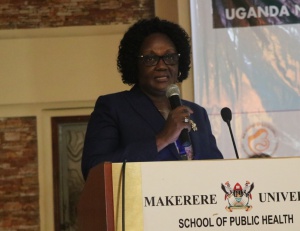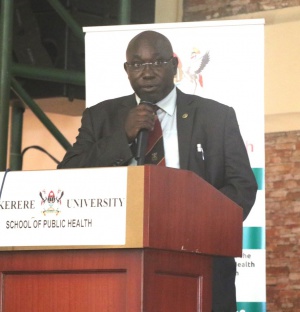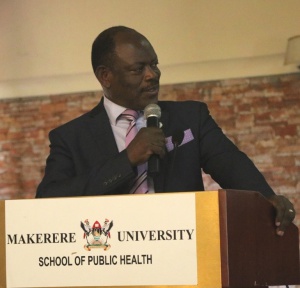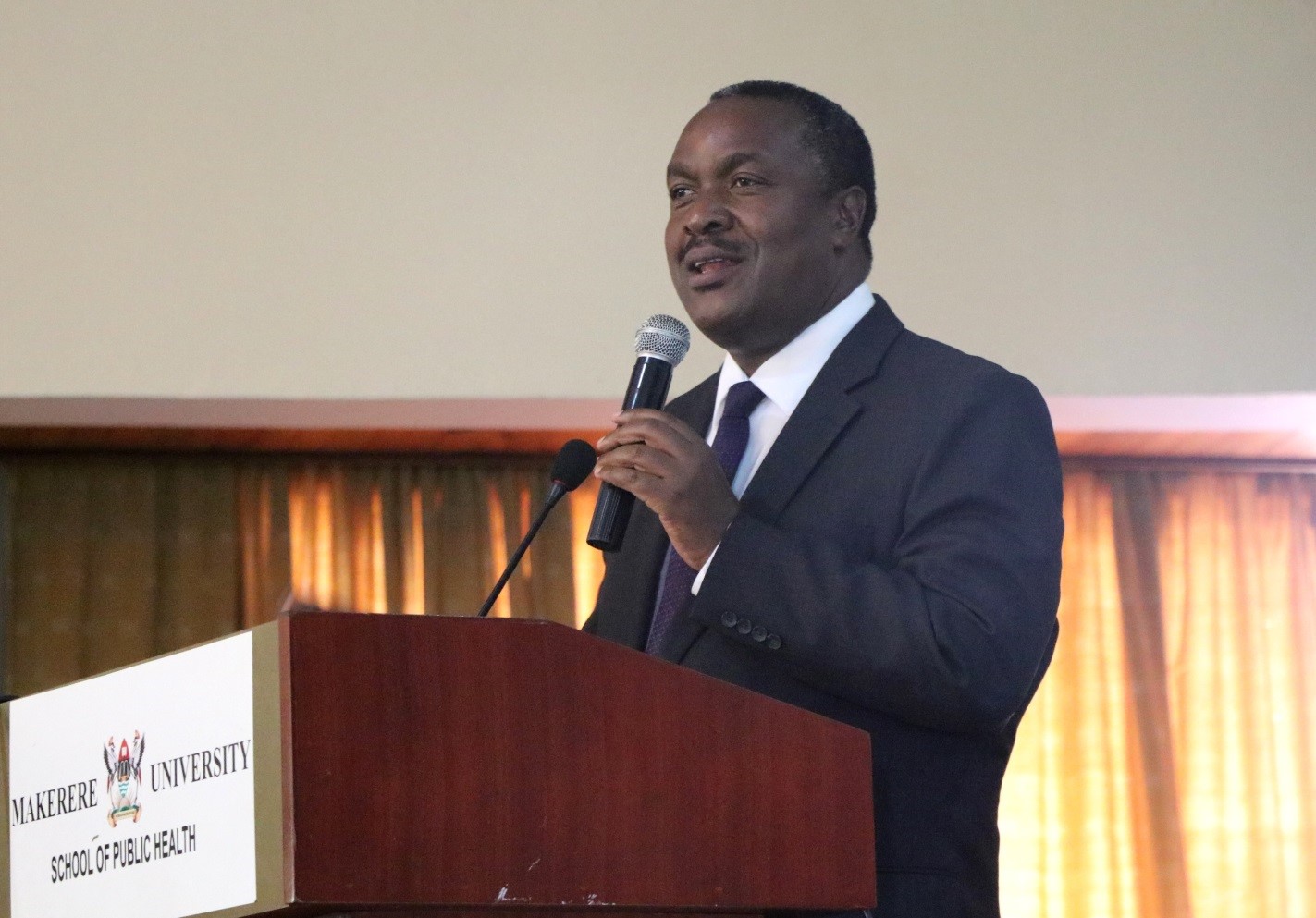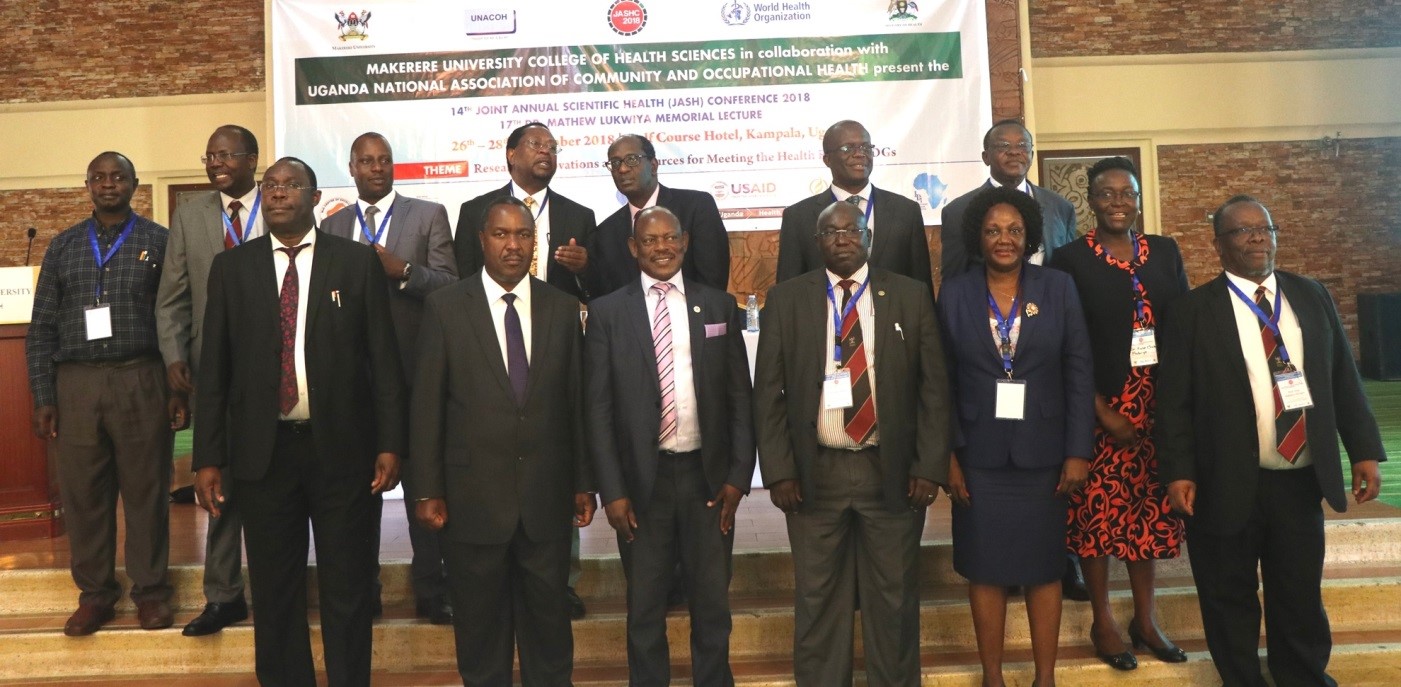
(Foreground L-R: Dr Joseph Okware-Commissioner in charge of Quality Assurance and Supervision in the Ministry of Health, Hon Elioda Tumwesigye-Minister of Science, Technology and Innovations, Prof Barnabas Nawangwe-Vice Chancellor of Makerere University, Dr Isaac Okullo-Deputy Principal of Makerere University’s College of Health Sciences, Prof Rhoda Wanyenze-Dean of Makerere University School of Public Health and Prof Fred Wabwire-Mangeni of Makerere Universiy School of Public Health who is also a former dean of this School.)
On Wednesday 26th September 2018, the Joint Annual Scientific Health (JASH) Conference started at Golf Course Hotel, hosted by Makerere University School of Public Health (MakSPH) in partnership with Uganda National Association of Community and Occupational Health (UNACOH), Ministry of Health (MoH) and the World Health Organization (WHO). The immense expectation and anxiety of the organizers soon gave way to a tangible sense of accomplishment as the participants started pouring in, and the audience grew to astonishing levels.
In her opening speech, the Dean MakSPH, Prof Rhoda Wanyenze, welcomed all the guests to the function. She thanked the organizing committee, chaired by Prof Fredrick Makumbi and Dr Elizabeth Ekirapa Kiracho, for investing immeasurable time, effort and ideas to relentlessly pursue the success of the conference.
She disclosed that a survey that had been done by MakSPH revealed a very good trend in published work, with 200 publications annually, in peer-reviewed journals, beside the dissemination workshops and presentations in international conferences.
“We are continuously trying to engage our partners at WHO, MoH as well as Centre for Disease Control and Prevention (CDC) to make sure that our research is aligned to address the major evidence gaps and the evidence-based health research needs of our country”.
Prof Wanyenze, also revealed that while a lot of research had been done, most of it had been “dramatically skewed to infectious diseases especially HIV/AIDS” because of the nature and demands of the research funds. She urged fellow researchers to focus on what is “important for our development and public health needs”. She gave South Africa as an example of a country where university research is aligned with national needs in addition to having top-of the-charts universities in Africa because “they invest in funding research and capacity-building”. Prof Wanyenze asked the Chief Guest, Hon Elioda Tumwesigye, the Minister of Science, Technology and Innovation, to move the agenda of funding research forward, “to develop the areas of research” which were underfunded, citing the example of Non-Communicable Diseases.
Dr. Isaac Okullo, who represented the Principal of the College of Health Sciences (MakCHS), revealed that JASH became what it is (a Joint Conference) when UNACOH came on board as part of the organizers, adding that “it’s an opportunity which is commendable”. He also said that:
“The College of Health Sciences is a hub of research and innovation; JASH is meant to foster and advance innovation in public health at both national and sub-national levels”, further revealing that “outcomes of the previous conferences have contributed to improvement of health service delivery in Uganda, which include efforts towards universal health coverage through increased immunization, efforts towards eliminating malaria, tuberculosis and HIV/AIDS.”
Dr Okullo challenged participants to not only “just discuss and improve abstracts”, but to also prepare to act as the “expression to act is the gist of the conference”. He re-iterated the need for resources as an important tool in attaining health-related SGDs, and called upon government to “realize the central role of bankrolling research and innovation”. He added that “donors always want areas that are of interest to them”, citing an example of Schistosomiasis with a prevalence of 29% in the country. “Ugandans are suffering while the rest of the world may not know; funding in this area is wanting; maybe government should take interest in it so that funds are made available to find ways of eliminating this problem”, he advised.
The Vice – Chancellor, Prof Barnabas Nawangwe (pictured above ) thanked MakCHS “for religiously holding these conferences every year”, adding that the precedent was a good example to the rest of the university. He also noted that “Makerere University is a big asset for this country”, adding that “practically all the research of this country”, is produced by the university. He reminded the audience that “the development of this country, just like every other country, relies very heavily on research. If we do not support research enough, we must prepare to lag behind in development”.
He also maintained that Makerere University “are the leaders in research in HIV in the world including Ebola”, adding that “we have also taken leadership in the biggest killer disease – Malaria – in the world”. Prof Nawangwe maintained that since no one had disagreed with him then his claim was most probably true. He also revealed that “MakCHS is the flagship for research at the University, and the most proficient research organization in the whole region”, much to the applause of the audience. He further said that since the top five researchers for all East Africa were from Makerere, an investment in the university “will be a good investment”.
Prof Nawangwe also disclosed that “a lot of research and innovations lie idle at MakCHS”, and decried the lack of funding that would turn these innovations into viable enterprises to “transform the country and provide jobs”. He pledged the continuity of research at Makerere University for both national and international interests.
Hon Tumwesigye (pictured above), who is also the Member of Parliament for Sheema Municipality, tasked the scientific community with ensuring that Ugandans live longer lives. “Abraham lived up to 175 years, Isaac died at 185 years”, he remarked, quoting Chapter 35 of the book of Genesis in the Bible. “These days people don’t live that long. With your science, we should soon reach 100 years life expectancy very soon”, he challenged. Rather humorously, he alleged that maybe Abraham was African after all, “because every time there was a problem, all the middle Eastern people ran to Egypt”. Where they running home for refugee? One only wonders! In similar breath, he challenged the scientific community present to find a lasting solution for malaria, wondering whether these parasites were being stubbornly more intelligent than science.
The chief guest at the opening ceremony, Hon Dr Elioda Tumwesigye, the Minister of Science, Technology and Innovation, expressed government’s desire to pursue the Sustainable Development Goals (SDGs), referencing particularly Goal #3 (which is to ensure healthy lives and promote the wellbeing for all at all ages). He challenged academia to “put into perspective” the aim of research, to more than “just passing exams, writing publications and becoming professors”. “It must be people living healthy productive lives at all ages at all levels”, he proposed.
Hon Elioda Tumwesigye revealed that government was creating a research and innovation park to overcome the challenge of innovations “dying” just after inception. The chief purpose of the park or hub, he further revealed, would be the incubation of research ideas from research data to actual viable marketable businesses which could be commercialized. He also revealed that the ministry was in the process of getting funds for technology and, for business incubation and innovation hubs. He further pledged support to the development of applications, technologies and processes by providing a testing platform for government departments and ministries, something he had been doing while serving as minister in the health ministry. The minister called upon academia to go beyond publications to having products and processes which can make money and create wealth. He also disclosed government’s efforts to create a department of innovations and intellectual property management to register innovations and to connect innovators to possible funding. The same department would provide patenting services for innovations that needed it. He admitted that his ministry was convinced that it needs to work with universities because decisions are taken based on the best scientific evidence. All planning departments of government must have scientists – that’s the president’s direction”.
Other dignitaries at the event included Dr Patrick Kadama, the Chairman UNACOH and Dr Joseph Okware, the Commissioner in charge of Quality Assurance and Supervision in MoH.


